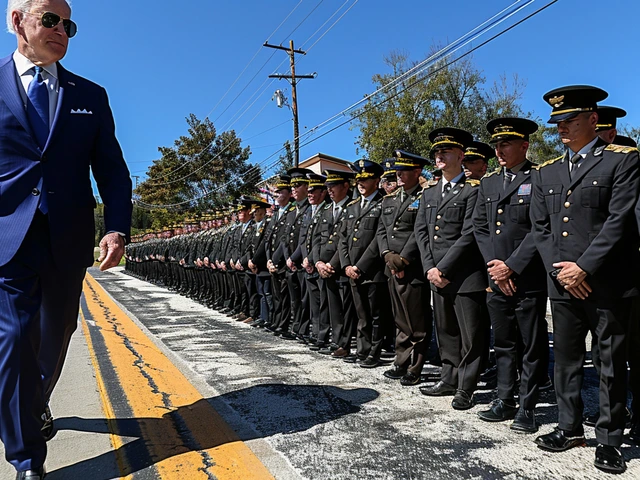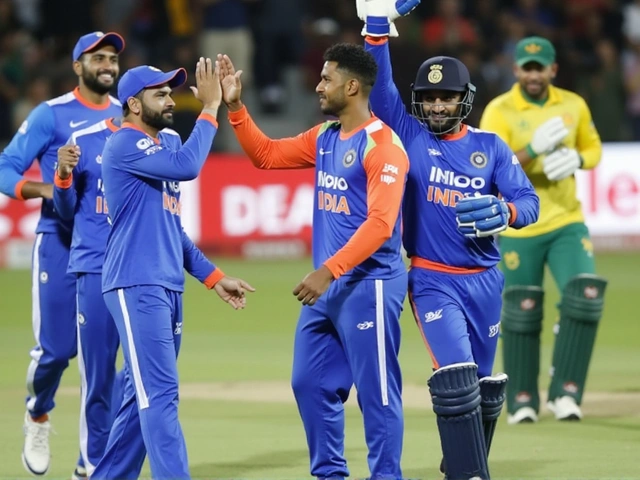When Fluminense FC knocked out FC Internazionale Milano 2-0 in the FIFA Club World Cup 2025Bank of America Stadium on Monday night, the football world didn’t just blink—it rewrote its assumptions. The Brazilian club, representing CONMEBOL as Copa Libertadores champions, didn’t just win. They hummed a quiet, defiant tune in the face of European dominance. German Cano opened the scoring in the third minute. Hercules sealed it in the 93rd. And suddenly, the narrative of the tournament shifted. This wasn’t just an upset. It was a statement.
A Night of Quiet Dominance
The match began with a flash. A cross from Jhon Arias, slightly deflected, looped toward the far post. German Cano, unmarked, rose like a man who’d been waiting for this moment his whole career. He powered it past Yann Sommer, Inter’s veteran goalkeeper, and the net rippled. The crowd of 20,030—sparse by global standards, but thick with Brazilian flags—roared. The heat, 90 degrees Fahrenheit, made the pitch slick, the air heavy. But Fluminense didn’t flinch. Inter Milan, the 2024-2025 UEFA Champions League runners-up, owned the ball. 68% possession. 16 shots to Fluminense’s 11. Demarco hit the bar. Lautaro Martínez clanged one off the post. Sommer made a world-class fingertip save on Cano’s follow-up. Yet, nothing stuck. The Italians passed with precision, but their final touch vanished in the final third. They moved like a symphony playing the wrong score. The disallowed goal by Ignacio in the 42nd minute—the offside call was tight, borderline—felt symbolic. Fluminense didn’t need to dominate. They needed to survive. And they did.The Moment That Broke Inter
Then, in the 93rd minute, the impossible happened. A turnover. A long ball. Hercules, a 23-year-old winger barely known outside Rio, found himself alone in the box. No defender. No pressure. Just space, heat, and a chance. He didn’t hesitate. One touch. One shot. Goal. The stadium erupted. Fluminense players sprinted toward the sideline, leaping, screaming, arms locked around each other like a family who’d just escaped a fire. They hopped in unison, a human knot of joy. Inter’s captain, Lautaro Martínez, didn’t celebrate. He didn’t even walk off calmly. He turned to reporters, voice tight with frustration: “Whoever doesn’t want to be here should leave.” It wasn’t just about the loss. It was about the context. Inter had just lost the Champions League final in Munich on May 31. Now, barely a month later, they were sent home in the first knockout round of a global tournament—by a team from Rio, in North Carolina, under a brutal sun.Why This Matters Beyond the Scoreline
European clubs have won the Club World Cup in 18 of the last 20 editions. South American teams? They’ve been outliers. Flamengo beat Liverpool in 2019. That was the last time a CONMEBOL side lifted the trophy. Since then, it’s been Real Madrid, Manchester City, Bayern Munich—all of them European giants. Fluminense’s win isn’t just about advancing. It’s about breaking the myth that European football is untouchable in global competition. This isn’t a fluke. Brazil has won the Copa Libertadores three of the last five years. The talent is there. The hunger is there. And now, the confidence is there. The tournament, running from June 14 to July 13, 2025, spans eight U.S. cities—from Miami to Seattle. But Charlotte, with its sparse crowd and sweltering heat, became the stage for the most shocking moment so far. Fluminense didn’t just play. They exposed a vulnerability.What’s Next for Fluminense and Inter
Fluminense will face the winner of Manchester City versus Al Hilal in the quarterfinals on Friday, July 4, at Camping World Stadium in Orlando. If they win, they’ll be one game from the final. That’s a path no Brazilian club has walked since Palmeiras in 2021. For Inter, the fallout is just beginning. Manager Simone Inzaghi faces questions about rotation, mentality, and whether the team’s focus shifted too early after the Champions League final. The club’s board has yet to comment, but sources say internal reviews are already underway.A Legacy in the Making
This match didn’t just end with a whistle. It ended with a question: Who’s really the best in the world? Inter had the pedigree. Fluminense had the pulse. And in the end, pulse won. The broadcast reached 3.2 billion viewers globally through DAZN’s exclusive deal. But the real audience was the next generation of players in São Paulo, Buenos Aires, and Medellín. They saw it. They believed it. And now, they know: even against giants, you just need one moment.Frequently Asked Questions
How did Fluminense manage to win despite Inter’s possession advantage?
Fluminense won through discipline, counterattacks, and clinical finishing. While Inter controlled 68% of possession and outshot them 16-11, they failed to convert key chances—Dembro hit the bar, Martínez struck the post. Fluminense absorbed pressure and struck on set pieces and transitions. Their two goals came from precise moments: Cano’s header off a deflected cross, and Hercules’ solo finish in stoppage time. It was a masterclass in efficiency over dominance.
Why was Inter Milan’s early exit so surprising?
Inter Milan reached the 2024-2025 UEFA Champions League final just weeks before this match, losing to Real Madrid on May 31. As Champions League runners-up, they were among the tournament favorites. No Champions League finalist had been eliminated this early since the 2025 Club World Cup expanded to 32 teams. Their exit marks the earliest for a European finalist in the modern format, signaling a potential shift in global club power dynamics.
What does this mean for Brazilian football?
Fluminense’s run revives Brazil’s reputation as a powerhouse in international club competitions. Brazilian teams have won the Copa Libertadores three of the last five seasons, and this win extends that momentum. It’s the first time a Brazilian club reached the quarterfinals since Palmeiras in 2021. If they advance, it could inspire a new wave of confidence across CONMEBOL, challenging the notion that Europe always wins on the global stage.
Who are German Cano and Hercules, and why are they important?
German Cano, a 28-year-old striker from Colombia, has been Fluminense’s most consistent forward this season, scoring 14 goals in the Copa Libertadores. Hercules, a 23-year-old Brazilian winger, had only three goals for the club before this match. His winner in stoppage time was his first in international competition. Their impact was monumental: Cano opened the scoring, Hercules delivered the knockout blow. Both are now national heroes in Brazil, symbolizing the rise of under-the-radar talent on the world stage.
How does this result affect the overall Club World Cup tournament?
This result reshapes the tournament’s narrative. With Inter Milan out, the path to the final is wide open. Fluminense’s win proves that CONMEBOL teams can compete with Europe even in hostile conditions—heat, travel, and sparse crowds. It also raises the stakes for Manchester City and Al Hilal’s quarterfinal. If either wins, they’ll face a Brazilian side riding a wave of belief, not just skill. The tournament’s credibility as a true global championship just got a major boost.
Where will the next matches be held, and how is the tournament structured?
The FIFA Club World Cup 2025 runs from June 14 to July 13 across eight U.S. venues: Hard Rock Stadium in Miami, TQL Stadium in Cincinnati, Rose Bowl in Los Angeles, Audi Field in Washington, D.C., MetLife Stadium in New York-New Jersey, Lumen Field in Seattle, Mercedes-Benz Stadium in Atlanta, and Camping World Stadium in Orlando. Fluminense’s quarterfinal is on July 4 in Orlando. The final is set for July 13 at MetLife Stadium. The 32-team format includes champions from all six FIFA confederations, making it the most globally representative club tournament ever.




inter lost because the ref was bribed by the brazilian football mafia i saw it with my own eyes the ball was clearly onside on that disallowed goal and that cano guy is just a lucky striker who got one shot all night
fluminense showed what football is really about discipline and heart not just money and star names
the counterattacking structure fluminense used was textbook perfect every player knew their role and executed it under pressure
india would have beaten them easy we have better players than these guys
inter are just soft they cant handle heat or pressure real men play in the rain
...and yet...is this not the inevitable collapse of western hegemony in sport? the stars aligned not by chance but by cosmic rhythm...fluminense...a symbol of the oppressed south rising against the gilded cages of europe...the 93rd minute...a quantum leap in collective consciousness...
lautaro looked broken. he knew. they all knew. europe is done.
honestly the way hercules just stayed calm in that moment...i cried
possession metrics mean nothing when the final third is a black hole. fluminense exploited that with surgical precision. inter's midfield was functionally inert.
think about it this way: inter had the ball for two thirds of the match. they had the technical superiority the tactical discipline the coaching pedigree. but football isn't about control. it's about presence. it's about the moment when the universe pauses and a 23-year-old kid from rio decides he's not afraid. that's not skill. that's destiny. and destiny doesn't care about your trophies or your transfer fees. it only cares if you're ready to take the shot when no one's watching. fluminense didn't win because they were better. they won because they were willing to believe in something bigger than themselves. inter believed in their reputation. fluminense believed in their breath. and in the end...breath beats pedigree every time.